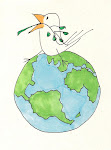I think most of my readers know me but even if you don’t, all you have to do is read my blog to know I have an opinion on just about everything. So it’s been uncomfortable and strange not feeling like I could form an opinion about whether or not the U.S. should pull out of Iraq. I’m clear on whether we should have invaded in the first place; I have been since way back in 2003 when I hung a “No War in Iraq” poster in my window and marched in demonstrations to no avail. (It’s nice to be vindicated, I guess, though I don’t really care for how that’s come about.) It’s a lot more complicated now. Clearly, leaving after creating chaos and dependence isn’t benign in the same way as not going in the first place.
I’ve been active in Move On in the past but I have to say I don’t particularly care for their position here. I’m a devout Democrat, but I don’t care for the positions of most democrats in Congress or Presidential candidates either. There’s something smarmy and political about rhetoric that says it’s the Iraqis' fault if they can’t pull themselves together to meet benchmarks, that the U.S. isn’t going to “hold their hands” forever. They didn’t make this particular mess; we did. They aren’t responsible for this so how can we hold them responsible? With all the might of the great United States, we don’t seem to have the power to fix it, so how can we expect that, after being factionalized and traumatized by years of savage war, they should?
I do think this is a quagmire and we will need to get out eventually. I don’t want to see more of our soldiers die. But I don’t want to see any more Iraqis die either. Sometimes Americans don’t bother to think about that little detail. Most of them are innocents. Just like most of our soldiers.
Some time ago, I read an article, “America's final mission in Iraq” by Chaim Kaufmann (February 11, 2007) in the Editorial section of the Boston Globe, and posted it as a link on my blog even though I still didn’t know quite what to write about Iraq. So many months later, it’s on my mind. I think it deserves more attention than it got. (Link to the full article under “Sources,” below.)
“At a certain tipping point, it is no longer possible for any authority in either community to muster a constituency determined and strong enough to suppress the ethnic cleansers emanating from their own community. Beyond that point, the war cannot be stopped until the warring communities are substantially separated. It no longer matters how the war started, or even whether most members of both communities actually want to wage an ethnic war. The ethnic cleansing will continue until nearly all mixed urban neighborhoods, towns, and rural districts have become unmixed, as forces representing whichever community is stronger in that locality kills or frightens away most members of the other. The eventual result is a de facto partition.”
”America still has one remaining military mission in Iraq whose completion is essential: refugee protection. Our 160,000 heavily-armed troops are more than enough to protect, transport, and resettle those Iraqis who have not yet become refugees but likely will as the civil war grinds toward completion. We should identify the 150 to 200 towns, villages, and urban districts that are most at risk for ethnic cleansing -- and sit on them until we can organize well-defended transport for those who wish to move.
The United States should do this because it is the right thing to do. Some people who might otherwise die at the hands of death squads will survive if US forces protect them long enough to relocate safely and without becoming desperately impoverished.”
One thing is clear: we need to do something different from what we’re doing. We ought not leave a power vacuum and no protection for ordinary Iraqis from the unbridled ethnic and religious conflict that is likely to occur in it.
We need to think out of the box. We need to accept responsibility for the unspeakable harm we’ve done, beg forgiveness and ask for the world’s help in setting things right. We need to act as a peacekeeping force, as Kaufmann suggests, or get one from countries that have not yet been involved. And we need to provide significant post war economic aid to rebuild what we’ve torn down.
Rebuilding our own tattered reputation may take longer to complete, but it too begins this way.
Monday, September 17, 2007
Subscribe to:
Posts (Atom)
Sources
- "...How to Make AYP Work...", American Educator Magazine
- "America's Final Mission in Iraq," Chaim Kaufmann, The Boston Globe, 2/11/2007
- "Despite Challenges, N.H. Primary Thrives" The Boston Globe
- "Hypermilers Squeeze Every Drop Out of a GasTank," by Chris Williams, The Boston Globe, 6/3/2007
- "King of the Hypermilers," by Dennis Gaffney, Mother Jones, Jan-Feb 2007
- "What do pants and the space shuttle have in common?" Hiawatha Bray, The Boston Globe, 11/13/2006
- Brown Alumni Monthly: "The New Atomic Scientists" Sept./Oct. 2006
- Here & Now Story : "Schoolyard Game Banned" 10/20/2006
- Hot Air (blog): full text of David Mackett's comments
- Mass. Driver's Manual, Chapter 4 (Signs)
- Netflix: West Wing Season 7, 2005 (including "King Corn")
- WBUR Boston
- Woodrow Wilson Center's Project on Emerging Nanotechnologies


